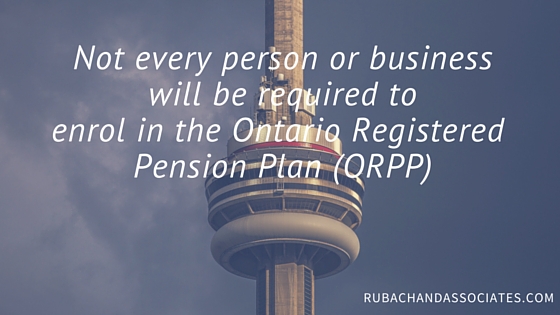Three years after it was first announced, the Ontario Retirement Pension Plan (ORPP) is starting to take shape. Despite opposition from political opponents and many in the business community, Premier Kathleen Wynne is pushing ahead to meet her government’s timeline for full roll out of her controversial retirement plan on January 1st, 2017.
With deductions starting to come off paycheques in less than a year, [tweet_dis excerpt=”What will ORPP mean for you, your income and your retirement via @rubachandassoc “]what will ORPP mean for you, your income and your retirement?[/tweet_dis]
What is the ORPP?
Before looking into the reasons for a provincial pension plan, it’s important to understand how the ORPP will work. Similar to the Canada Pension Plan (CPP), both employees and their employers will be required to contribute a matching amount of income to the new Ontario plan. Unlike CPP which mandates 4.95% from each party to a maximum of $54,900 of income, the ORPP will require 1.9% to a maximum of $90,000.
[tweet_box design=”default” excerpt=”ORPP will take less of your paycheque but will remove up to $1,710 of annual income @rubachandassoc “]The provincial plan will take less of your paycheque but will still remove up to $1,710 of annual income from working Ontarians.[/tweet_box]
The big caveat to the above is that not every person or business will be required to enrol in the plan. If you already have a workplace pension that falls within the framework of ORPP, you will be exempt from participating. While this exemption will not apply to most private sector workers, nearly all of those in the public sector will not be required to contribute more of their income for retirement. Teachers, city councilors and government staff, for example, will continue to receive their pensions without additional contributions. And those that are self-employed will also be exempt, with the possibility to voluntarily join the plan at a future date.
In total, over three million Ontarians are expected to enrol next year, with benefits starting to pay out by 2022. The maximum payout could be $12,816 for a high income earner when the plan reaches maturity in 2057. For those retiring within the next 10 years, however, little (if any) benefits will be paid out.
Challenges with the ORPP:
Critics have lined up against the new provincial plan. Everything from high administration costs to negative economic impacts to very need for another government backed retirement plan have come under fire. [tweet_dis excerpt=”The ORPP will amount to the largest social program in a generation in Ontario @rubachandassoc”]The ORPP will amount to the largest social program in a generation in Ontario[/tweet_dis] and deserves more scrutiny and consultation than has been afforded by the Ontario Liberal government to date.
While much needed details of the plan were recently released, the costs of implementation and administration remain to be seen. Much like any investment vehicle, it is important to keep management costs as low as possible to ensure your savings can accumulate efficiently. CPP currently costs about 1.2% each year to run. The ORPP, however, will likely cost more. According to pension expert and Carleton University professor Ian Lee:
it’s not “possible (to) bring the cost anywhere near that of the Canada Pension Plan, simply because it won’t have the economies of scale.” ~ Ian Lee, Carleton University
With less people, costs to run the plan will necessarily go up. At the very least, these details should be available for scrutiny prior to implementation.
A mandatory plan will almost certainly reduce private savings, with forced contributions leaving less money to invest in more flexible retirement vehicles such as RRSPs and TFSAs. When CPP expanded in the late 1990’s, with contribution rates rising from 2.8% to the current 4.95% per employee, Canadians responded by reducing their own private savings at an almost equal rate. A Fraser Institute study by Charles Lammam found that for every one dollar increase in CPP contributions, Canadian households reduced private savings by one dollar. [tweet_dis excerpt=”Decreased private savings could lead to reduced RRSP contributions @rubachandassoc”]Decreased private savings could lead to reduced RRSP contributions[/tweet_dis], which provides Ontarians with a greater range of options than a fixed government pension plan. RRSPs can be used to tax efficiently fund the purchase of a house (Home Buyer’s Plan), education (Lifelong Learning Plan) and can be left to a designated beneficiary. Both CPP and ORPP remove this flexibility in favour of a one-size fits all, mandatory plan.
Economic Impact
Unsurprisingly, both large and small businesses in the province have come out against the plan, claiming additional costs will make it difficult to maintain current salary levels for employees. According to the Canadian Federation of Independent Business (CFIB),
[tweet_box design=”default” excerpt=”90% of small business owners believe they would have to freeze or cut salaries to afford ORPP @rubachandassoc”]90% of small business owners believe they would have to freeze or cut salaries to afford the added costs of the ORPP. [/tweet_box]
Even more concerning, CFIB projects a 0.5% increase in the unemployment rate within 5 years of implementation. It is expected that larger companies will likewise pass costs onto consumers rather than accepting decreased profits. Over the past few years, Ontario businesses have taken on significant new costs such as increased corporate tax rates, sky rocketing energy bills and a higher minimum wage. Adding yet another expense to business amidst a fragile economy risks job losses and reduced stability in the labour force.
A Savings Crisis?
Premier Kathleen Wynne claims there is a “retirement crisis that is confronting us” in Ontario. The ORPP was created to force workers to save more in order to ensure adequate income for their post-work life. But is there actually a ‘crisis’? While some Ontarians will have a short-fall in retirement, a number of recent studies contradict the very need for a new government plan. A 2009 study prepared by Canada’s finance ministers found that the current retirement income system is “providing Canadians with an adequate standard of living upon retirement.” Experts in the field, such as Malcolm Hamilton of C.D. Howe Institute, similarly believe most working Canadians today are saving enough through private plans and will have sufficient income in retirement, especially when government assistance is factored in.
That said, not everyone will have enough income for retirement. Seniors with minimal work history, for example, struggle to support themselves in old age.
[tweet_box design=”default” excerpt=”ORPP won’t provide significant assistance in helping low-income groups with retirement income @rubachandassoc”]A contribution-based pension plan, however, will not provide significant assistance in helping low-income groups build up adequate capital for retirement income. [/tweet_box]
It is mainly those who work full-time with a savings plan in place that will be affected by the new ORPP. The ‘retirement crisis’ among some segments of society requires targeted government programs, not a large, catch-all program that only deducts and invests income from those who contribute.
There is no free lunch when it comes to retirement planning. Money taken from employee pay cheques means less choice when it comes to retirement savings. There are real economic impacts stemming from the ORPP, both in individual households and the provincial economy. In many ways, it is a plan that is in search of a problem. Many Ontarians are already saving enough for retirement and will simply have less money for their RRSPs when mandatory deductions reduce their income. The Ontario government would be wise to reconsider this plan, or at the very least, continue to work with the federal government on improving the more-efficient CPP before doing it alone with the ORPP.




